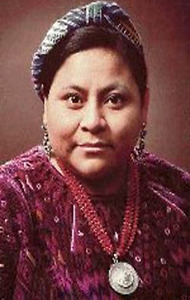Rigoberta Menchu Tum

Let there be freedom for the Indians, wherever they may be in the American Continent or elsewhere in the world, because while they are alive, a glow of hope will be alive as well as a true concept of life. Menchú.
“Peace cannot exist without justice, justice cannot exist without fairness, fairness cannot exist without development, development cannot exist without democracy, democracy cannot exist without respect for the identity and worth of cultures and peoples.” Menchú
The activist Nobel Peace Laureate, Rigoberta Menchú Tum, a K’iche’ Maya woman, born in 1959 in Chimel, Guatemala, dedicated her Nobel Peace Prize in 1992 to her father Vicente. Ms. Menchú Tum was also the official spokesperson for the United Nations International Decade of Indigenous Peoples (1994 – 2003).
Through the publishing of her book, “I… Rigoberta Menchú”, for which she won the Nobel Peace Prize, the United Nations declared 1993 the International Year for Indigenous Populations. The $1.2 million cash prize was used to set up a foundation ultimately in her name to continue the fight for human rights of indigenous people. She was the youngest recipient at 23 years old. Ms. Menchú’s book became a controversial piece for the inconsistencies of the stories she describes but held up to her cause.
She says that her purpose is to bring to world attention the abuses against the Indigenous Indians of her country. With the writing help of Venezuelan anthropologist Elizabeth Burgos, I… Rigoberta Menchú has been translated into several languages and is required reading in many universities. Chimel, located in the northern highlands of Guatemala was home to Ms. Menchú’s indigenous Quiche family.
The Military-led government and wealthy plantation owners became interested in this area. They began taking Indian-occupied lands by force. Having no rights as indigenous people they began to organize and formed the United Peasant Committee. Menchú’s father, Vincente, was Rigoberta’s motivation to follow him as an activist. He became a leader in the peasant movement that began in the 1970’s.
The movement wanted to secure the territory in which the indigenous people lived. Señor Menchú had been arrested and imprisoned many times for his activities of organizing petition. He later continued organizing protests to secure the northern highlands and the human rights abuses against them. As Rigoberta describes, her sixteen-year-old brother, Petrocinio, was kidnapped by soldiers in 1979, tortured and burned alive while his family stood by helpless.
The following year Señor Menchú, along with thirty-eight other Indian leaders, died in a fire at the Spanish embassy, while protesting violations of Indian human rights abuses. Rigoberta was already an activist in her father’s movement, the United Peasant Committee, when her mother, a healer, also a leader in the movement, was kidnapped, raped and tortured, then killed just a few months after the embassy fire.
Wanted by the Guatemalan government, Rigoberta left her country after her mother’s death in 1982 and fled to Mexico. Wanting to bring the social injustice of her people to the attention of world she dictated “I …Rigoberta Menchú” (1984), her autobiography, sharing her story and of the lives of the Quiche Indians. Her cause, through her book, brought international attention of the conflict between indigenous Indians and the military government of Guatemala.
Rigoberta Menchú continues her movement as a symbol of peace through her foundation, The Rigoberta Menchú Foundation, having broken the silence of the violations of her people in Guatemala. She also continues to motivate women and indigenous people to vote so they can help make a difference in their country and in the rights of the Guatemalan people.
She continues her work with passion as the founder and Secretary of International Relations of the Winaq Political Movement Party and UNESCO Goodwill Ambassador. She is currently an active member of the Nobel Peace Prize Women’s Initiative (of which she is co-founder) and the Peace Jam Foundation, as well as a founding member of the Political Association of Mayan Women.
Among her awards are the UNESCO Education for Peace Award; the Prince of Asturias Award for International Cooperation; the Ibero-American José Martí Award; the Legion of Honor in the highest rank of Commander, from the French government, and the Águila Azteca Award, from the Mexican government.
He also received the Rubén Darío Cultural Order, from the government of Nicaragua; the Yuri Knórozov Medal, which recognizes the women and men of the Mayan world who participate with their voice, life experience, principles and traditional knowledge, in the International Festival of Mayan Culture 2013, Mérida, Yucatán.
Del Val Blanco, J., Bulletin UNAM-DGCS-739 Antigua Escuela de Medicina, Dec. 11, 2013. https://www.dgcs.unam.mx/boletin/bdboletin/2013_739.html
Menchú Tum, Rigoberta, Debry-Burgos, Elisabeth, Trans. A. Wright.
I, Rigoberta Menchú, An Indian woman in Guatemala, Verso (1984)
2nd. Ed.
